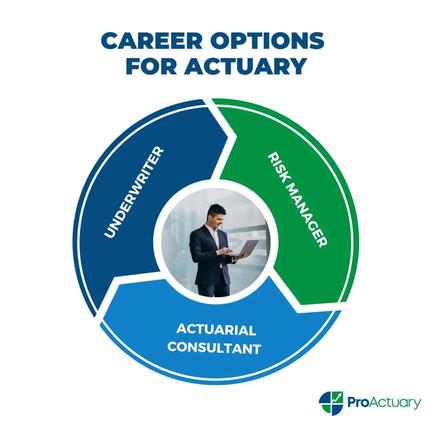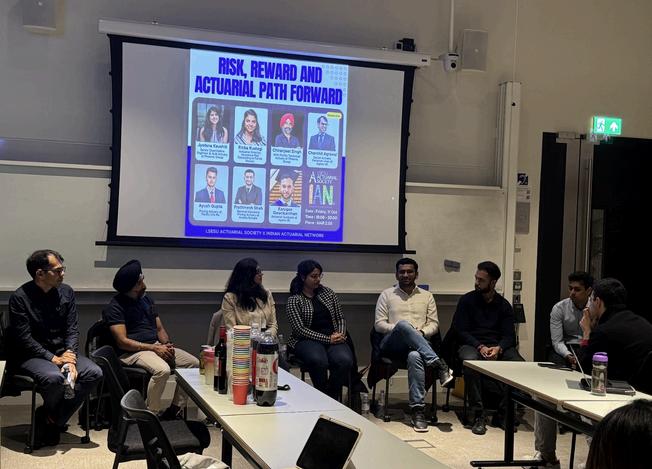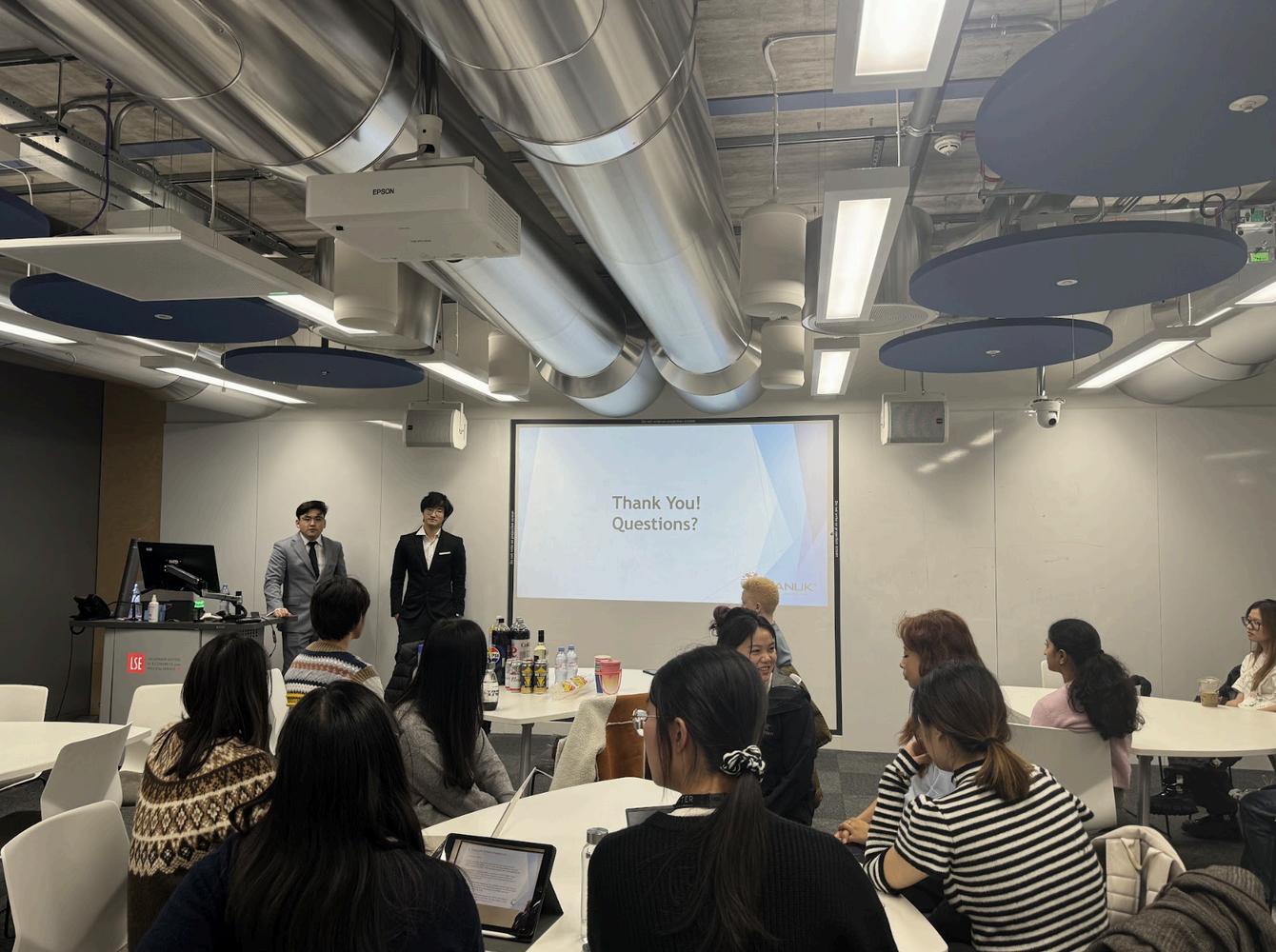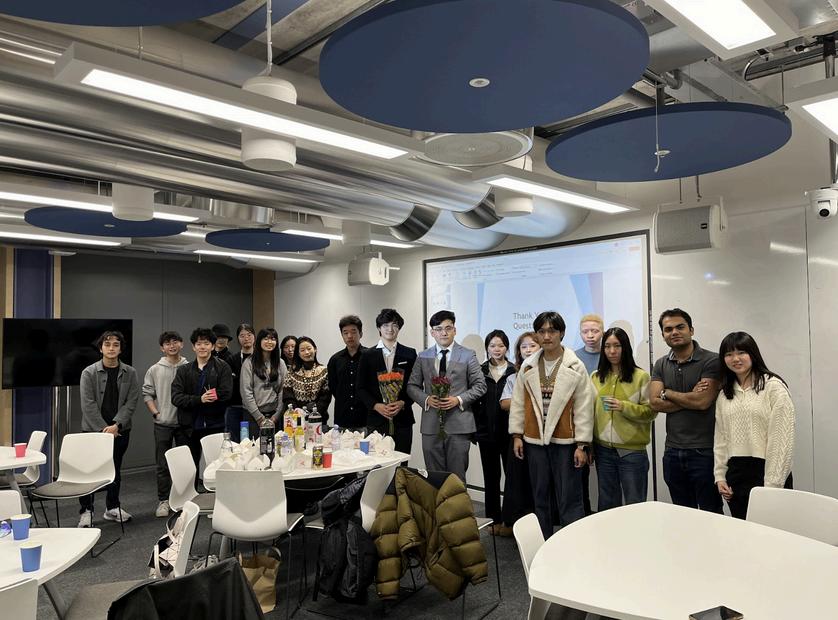






The LSESU Actuarial Society is the largest actuarial student society in London. Throughout the years, our society has built upon its successes and advanced our mission to educate the actuaries of tomorrow. Education and connection are the key value proposition that the LSESU Actuarial Society brings to its members. As part of our broader strategy of looking into the future, we strive towards providing more professional development resources, opportunities, and actuarial insights for our members. Additionally, we seek to expand our coverage on emerging actuarial trends by hosting diversified events to further extend our reach on topics outside of the traditional Actuarial professions.
We organise talks and workshops to raise commercial awareness among our members about pensions and insurance while exploring the way actuaries respond to challenges in this ever-evolving world with endless possibilities. There are various opportunities to ask seniors and alumni about their experiences working in actuarial placements, and providing members with advice about internships is also one of the great services our society can offer.
Additionally, we host networking events that connect students directly with industry professionals, providing them with the opportunity to foster relationships that are essential for career development. We are committed to providing our members with memorable experiences and insights about Actuarial Science, and most importantly, ‘Equipping the Actuaries of Tomorrow’.
To highlight some key successes from the 2023-2024 academic year, we proudly hosted our 11th annual Actuarial Conference at LSE, featuring the President of the Institute and Faculty of Actuaries (IFoA) as a distinguished guest. Additionally, we successfully organised our 2nd Actuarial Case Competition, supported by our sponsors and partners.
This academic year, the research division will be responsible for releasing a newsletter to members and nonmembers of the society. Our members will get exclusive access to the newsletter a few days before public release and access to exclusive stories.
Keep readers up to date with changes in the industry
Update readers on actuarial roles and opportunities they can get into
Update readers on what we are doing as a society
Our newsletter is mainly targeted towards Undergraduates and Postgraduates looking to join the actuarial field but even if you don’t fall into those that category feel free to give our newsletter a read.

The Autumn Budget introduced several changes in regulation and taxation. In this piece, we will explore how these changes impact the pensions industry.
First, let's review the expectations leading up to the budget.
Key changes that were anticipated before the budget included:
National Insurance (NI) was to be levied on pension contributions
Increase in Capital Gains Tax (CGT) so that it would fall in line with income tax bands (20% for basic-rate taxpayers and 40% for higher-rate taxpayers)
Changes to pensions tax relief (e.g. implementing a flat rate)
Cut on tax-free lump sum available to pensioners at the start of decumulation
This was Stewart Hastie, Chair of the Association of Actuaries, in response to the speculation ahead of the budget. “It would be an ‘own goal’ for tax changes to worsen the savings adequacy challenge that current and future generations already face and that the second stage of the Government’s Pensions Review is seeking to address.”
There were no changes to employee’s NI, which was reduced earlier in the year, as Labour wanted to live up to their manifesto promises. However, employer’s NI rose by 1.2 percentage points (1.2p) from 13.8% to 15%. Employers were hit with a double whammy, as the threshold at which employers start paying NI fell from £9100 to £5000 per annum. However, Employment Allowance rose from £5000 to £10000. Employment Allowance allows some employers (typically small businesses) can reduce their NI liability. The Institute for Fiscal Studies (IFS) called on both parties to reverse the 2p cut to National Insurance in the run-up to the general election. Director of the IFS, Paul Johnson said Rachel Reeves was handed a "genuinely difficult inheritance". "The last government must take a lot of the responsibility. Its spending plans for this year and the future lacked credibility. To cut £20billion from employee National Insurance last year in the face of known fiscal pressures was not responsible." The changes to NI will make salary sacrifice more beneficial for employers so some employers may look to sign up their employees to these schemes to reduce the added cost. Reeves’ changes NI is budgeted to raise £25billion, which would be more than the reversal of the employee 2p cut. The National Minimum Wage (NMW) for over-21s will rise by 6.7% and for 18-20 year-olds, it will go up by 16%. The NMW for 18-20 year-olds saw a huge rise as part of Reeves’ long-term plan to move to a ‘single adult rate’.

From 2027, pensions will be classified as a part of someone’s estate so unclaimed pension benefits will now be taxed under Inheritance Tax if the estate exceeds the Inheritance Tax threshold (which hasn’t changed). The Tax Group Chair for the Society of Pension Professionals, Steve Hitchiner, said the change was “not entirely unexpected”, he also added that “overall this makes sense, and is a more attractive solution for raising revenue than many of the speculated alternatives such as reforming pensions tax relief or imposing NI contributions on employer pension contributions”. There will be an increase to the state pension and pension credit, they both will rise by 4.1% going up in line with earnings, as the chancellor kept her promise to keep the triple lock. The triple lock sees pensions go up in
line with whatever is higher between, inflation, earnings and 2.5%. As a result of the increase in the state pension, the state pension will be 95% of the personal allowance. The chancellor confirmed that the tax bands will stay the same up until April 2028 and because the state pension will continue to increase by at least 2.5% annually, by April 2027 the state pension will be taxed for the first time in history.
Reeves confirmed there would be an increase in the rate of Capital Gains Tax (CGT) paid by basic-rate taxpayers from 10% to 18% and from 20% to 24% for higher-rate taxpayers. The rise in CGT will make pensions and Individual Savings Accounts (ISAs) more tax efficient.
Industry experts generally praised the lack of any ‘drastic’ pension tax changes in the Autumn Budget, but many referred to it as a “missed opportunity” for broader reforms. This was Steve Hastie’s reaction to the budget, “Whilst it’s good news that most of the pensions tax changes that were widely speculated and considered have not been taken forward at this budget, the extra NIC burden on employers combined with major increases in minimum wages will inevitably impact future employment levels and pay growth. For some industries with high levels of minimum wage employees, we may see some inflationary pressure as employers pass on extra costs.”
The IFS has said that the government will fall short by £9billion on their goal to raise £40billion through changes to taxes, this could mean further tax rises ahead. With employers having to pay more due to the rise in NI and the NMW it is unlikely the government can impose a higher minimum employer pension contribution rate, which currently stands at 3%. The chancellor is likely to announce more changes in her Mansion House speech later this month.

If you ever had thought of what the Co-op and NFU Mutual have in common, then one answer I could give to you is that they’re both mutual insurers. Insurance companies that fall in the category of being consumer co-operatives are referred to as mutual insurers (just to note both the Co-op and NFU Mutual provide insurance, but the key difference is the former is predominantly a wholesaler whilst the latter is one of the UK’s largest mutual insurer).
Today, mutual insurance companies still exist, but the three that dominated the market in the 18th century have all been taken over, through mergers and acquisitions Many of the mutual insurers that have emerged in the last century have come in to fill in the gaps in insurance provisions that had been caused by hard market conditions.


A mutual insurance company is a company primarily owned by its policyholders (it is important to note, policyholders cannot transfer their ownership). The profits generated by mutual insurers may be distributed as dividends or are used to reduce the cost of future premiums. Whereas for a stock insurance company, they are owned by investors who have bought stocks in the company, they also happen to benefit from dividends. Insurers we are more familiar with like Zurich and Allianz are stock insurance companies
The main goal of a mutual insurance company is to maintain enough capital to meet the needs of its policyholders, while the goal of a stock insurance company is to maximise profits for shareholders. Both types of insurers generate income from premiums and investments, but stock insurers can raise funds by selling additional shares, while mutual insurers adhere to stricter underwriting and conservative investment strategies to protect the shared assets of their policyholders.
Before looking at the first mutual insurers we will take a slight detour by looking at the start of property insurance.
The Great Fire of London destroyed 13,200 homes and many iconic buildings including St Paul’s Cathedral. The damages were estimated to cost £10 million at the time, this would be equivalent to hundreds of millions or potentially billions in the present day. Economist and property developer, Nicholas Barbon, made a lot of money out of rebuilding areas of the city (such as Holborn and Strand just to name a few).

1681
Barbon went on to create the first known fire (stock) insurance company, the "Insurance Office for Houses”. When he opened his company, he offered insurance for 5,000 homes in London. The success of stock insurance companies petered out as market speculation would lead to ruin, as was the case in the South Sea Bubble of 1720 The government subsequently imposed stricter regulations on Stock Insurance.

1696
Following Barbon’s success, a lot more fire insurance companies came along. One company that came along was the Hand in Hand Fire & Life Insurance Society, founded in 1696, they were the first known mutual insurers in the UK. The introduction of fire insurance saw the introduction of fire brigades. Fire insurance companies issued plaques known as ’fire insurance marks' to their customers, these plaques allowed the insurance company to identify properties that had taken out insurance with them and the plaques were made out of metal so that they wouldn’t burn. The fire brigades employed by the fire insurance companies would also go out and stop buildings burning that were not insured by them because they knew that the fire could spread and soon spread onto a building that was insured by themselves. As the number of brigades started to grow this practice diminished.
Mutual insurance gained popularity for several reasons:
1. Accessibility: Local associations established early mutual insurers, making it easier for those who might not qualify for stock insurance due to financial barriers
2. Customer Trust: The cooperative model fostered trust and community, reducing conflicts of interest inherent in stock companies focused on shareholder profits.
3. Lower Costs: Without the need to generate profits for shareholders, mutual insurers often offered lower premiums, appealing to those with limited finances.
4. Limited Regulation: At the time, mutual insurers faced less regulatory scrutiny, making them more straightforward and less vulnerable to market fluctuations.
For most of the 18th century, mutual insurance companies dominated the fire insurance market, estimates suggest that the three largest mutual companies (Hand in Hand, Union, and Westminster) accounted for over half of all fire insurance receipts in London during the first twothirds of the century when London was home to over 70 percent of properties insured in Britain. By 1708, Hand in Hand had 13,000 policyholders, which grew to 57,000 by 1730, insuring over £11 million, making it likely the largest fire insurer in the UK.

Mutual insurers began losing ground to stock companies due to several factors:
1 Access to Capital: Stock insurance companies had the advantage of being able to sell shares to raise capital. This allowed them to grow their operations and offer a wider range of products. Their improved financial strength made them more competitive.
2. Investment Opportunities: As the economy expanded due to urbanization and the Industrial Revolution, investors had the potential to generate higher returns. Consequently, investment strategy became increasingly important for determining the profitability of companies.
3 Regulatory Changes: Improved regulations made stock companies more stable and trustworthy, reducing perceived risks.
4. Marketing and Branding: As demand for insurance products grew, stock insurers invested in marketing to establish a strong market presence and build customer trust.

From the Industry Expert : Matthew Byrne Head of Actuarial Function at NFU Mutual, 27 years working as an actuary
Q. Many mutual insurers were founded during hard market conditions, in the present day do you believe mutual insurance companies are better at offering a good service to consumers during the hard market stage of the underwriting cycle?
A “Mutuals have the advantage that they don’t have to earn ‘extra’ profit to satisfy shareholders. They can be more focused on service at all stages of the underwriting cycle.”
Q. Policyholders are very consensus about climate change and other problems, how are mutual insurers like NFU changing their investment strategy to reflect that?
A. NFU is committed to “Doing Business the Right Way”. This means “[We] continue to incorporate Environmental, Social and Governance factors in our decision-making, how we operate our business and our supply chain, where we place our investments and the products and services we provide ”
Q. What role do you think mutual insurance will play in the next 20 years?
A. “I hope that mutuals will continue to demonstrate how they add value for customers I think more consumers these days do take an active interest in how the firms they interact with operate. Mutuals have a good story to tell because of their customer focus.”


You’ve been a recruiter for more than 15 years now, one thing that is evident from looking at employment statistics, people are moving jobs more frequently than ever before, what else have you seen change during your time as a recruiter?
“There has always been a need for more people to come into the profession and that's the case across all sectors, pensions, investments, life insurance and general insurance The graduate level is probably the hardest point to find opportunities but once you have experience, you ' re going to be in demand, that's been the case for many years and I imagine that will continue


I guess over time, the particular sorts of skills within each sector have changed. Obviously, technology has had an impact, some of the stuff that would have been done manually on pen and paper, and then spreadsheets can now be done using all sorts of complex tools. In the consulting world, there’s less of an emphasis on being able to crunch the numbers, but more of a focus on actually being able to understand them, interpret them and help your clients understand what's going on with the numbers and what that means for them so they can make decisions.”

Actuarial recruitment specialist with 19 years of experience
Founder and Pensions Actuarial Recruitment Specialist at Turner Perkins
Specialises in helping pension actuaries with all aspects of their career moves
Host of the Actuarial People podcast - designed to give greater insight into the people behind the profession
Each week James is joined by a guest and he explores why the guest chose to become an actuary, what the role entails on a day-today basis and how they managed to balance work, life and exams.
What makes some companies better than others in terms of being able to retain their staff?
“Most people understand the value of trying new things, particularly in the early stages pf their careers If you get put in a team that does one type of work and you ' re in that team for 10 years, there are a lot of things within the actuarial field that you ' re just never going to see. If people feel like they've seen as much as they can see in their role, they will then start thinking, well, what else is out there? Can I move from pensions to insurance? Can I move to a different insurer? I think from a company point of view, it's making sure that the opportunities that you have across your business are visible and accessible to as many people as possible
You don't want to lose people who could have had a change of role internally You want to make sure that people are aware of and have access to lots of different types of work within the business The most common reason people stay with the company, as well as having good opportunities, is the culture and the relationships they build with people around them. Making sure that your culture is appealing to the people that work for you is also important”

Do you think what employees are looking for has changed? I'll break this question down into two parts. In terms of the nontechnical side, many employers are saying they want to see people bring their ‘true selves’ to work, it seems like this has arisen from the push for diversity, equity, and inclusion.
“Companies tend to hire people who they think will get along with their colleagues, people they get on well with during an interview conversation, people who have a positive attitude and the right approach to work, but who also have the right skills and experience. Being your true self when you interview and also when you join the company is really important If you meet someone who's putting on an act just to try and get through an interview, you have no idea what they'll be like to work with If you secure a role without being yourself, you might then have a tough time settling in, relaxing and enjoying the journey
What
“In episode 15 of my Actuarial People podcast, I spoke with Erik Snaathorst from Barnett Waddingham Erik is an Early Careers Manager, so is responsible for hiring new actuarial graduates, interns and apprentices. We chatted for an hour on what that process feels like to him. If you listen to that, that's the best insight I can offer you in terms of what it feels like to be on the company ’ s side
Maybe you ' ve got 120 entrylevel roles to fill each year, but you ' re getting close to 2,000 applicants How do you work through that? Most people entering the actuarial world have at least a 2:1, if not a first, so if you ' ve got a 2:2, is that going to get through that initial sifting? Is that the ATS that says no, or is that a person? Probably depends on the size of the company and things like that, but Erik gave a fantastic insight from his point of view

In terms of the technical side, is what employers are looking for also changing? The industry is constantly changing, there's the emergence of AI for example, and there's quite a lot of discussion as to how that's going to change how actuaries work in the future.
“When I came out of university, if you had a computer skills section on your CV, it would list things like Word, PowerPoint and Excel. Now companies are looking at whether you have worked with coding languages like Python. The expectations in terms of your computational skills are much higher than they were before
How will AI impact things? It's such a hard question to answer because no one knows right now To the average person using AI, it just looks like a more advanced version of Google I think at the moment, a lot of companies are still figuring out how they can get the most out of it The likelihood is there will be quite a few aspects of work that can eventually just be handed over to AI. If you ' re a consultant, then a big part of your job is going to be bridging the gap between what a computer says and what a human being in front of you in a meeting room understands, so there are going to be many aspects of the role that can’t be replaced.”
“For graduates, you may have shown that you ' ve done brilliantly academically, but are there other things that you did on your course that others didn't? Have you given presentations? Have you developed people skills? Organisational skills? Have you put yourself out of your comfort zone? Have you done a year in industry (even if it's not actuarial)? If you ' ve been working hard to earn money


and you ' ve learned some skills through a weekend job, make sure the employer knows that because there could be someone else who has just focused on studying. I would focus on what differentiates me from the other people who've also got the same academic background, getting that across in your cover letter and your CV is vital
At the experienced level, the mistake that most actuaries make is that they're very good at detailing all the technical experience they have, but they're not good at giving a sense of the broader skills If you ’ re a consultant and you ’ ve produced a CV depicting all the technical knowledge you have but it tells me nothing about how you interact with clients or what's your role in the team, you ’ ve missed a trick.”
How should applicants hone their CV and cover letter?
“I think applicants should try and put themselves in the shoes of the person on the other end of it. Understand as best they can who might be reviewing the application and what they might be thinking Make sure you understand as much as you can about the company you are applying for, the role and the skills they are looking for Think about how your application might stand out against others Don’t use AI to write your cover letters –that sort of thing can be spotted very easily when looking at applications in high volume”
What would you say is the future of pensions?

“I think in the future the conversation will be about ‘retirement’ rather than just ‘pensions’. We don’t know for sure how long DB schemes will last, and there are concerns about whether DC and other options are going to be sufficient. I can imagine a world without pensions as we know them, but I can’t imagine a world where people don’t need a plan in place to save for later in life when they can't work Actuaries & consultants are going to be needed to work on that solution and its very exciting.
What have you learnt during your time presenting the podcast?
“I’ve learnt a lot, first of all, it's a fantastic profession When I started doing it, my biggest concern was, can I do this every week? Should I just do it once a month because I can probably persuade 1 person a month to take part, but I wanted it to be weekly and it was a massively pleasant surprise, the number of people that just said yes straight away, and the number who approached me without being asked. So many people in the industry are keen to help others as much as they can.
I can’t imagine a world where people don’t need a plan in place to save for later in life when they can't work.








What are the key soft skills for the role?
Our panellists highlighted communication as a crucial soft skill for the role, alongside effective presentation skills. They also emphasised the importance of having a willingness to learn, suggesting that students can demonstrate this by taking online courses.

Should you prioritise salary, location, or speciality?
The panellists agreed that specialisation should take priority while acknowledging that both salary and location are also important factors. They stressed the significance of choosing a speciality before advancing to later exams, noting that delaying this decision can make it harder to shift directions. It’s essential to give yourself time to evaluate your options and understand your preferences within each speciality. Some panellists admitted they didn’t initially choose their current specialities but found them to be the right fit. They also pointed out that certain specialities, like pensions, are often overlooked. In response to an audience question about the pros and cons of different specialities, they discussed key differences that might appeal to some but not others. For instance, one panellist mentioned that as general insurance (GI) policies last a year, as opposed to life insurance (LI) policies which typically last a lot longer, he can quickly conclude whether the approach he took was right or wrong. Others favoured GI for its variety and dynamism, though noted it lacks the investment complexity found in LI and pensions. The panellists also shared examples of actuaries branching into fields like banking.
What are the unspoken rules for advancing an actuarial career in London?
While it may not be unspoken, the importance of networking is often under-appreciated by students. The panellists discussed the value of networking and shared tips on how students can network.


Why have you chosen to work in the UK?
The primary reason panellists chose to work in the UK is its status as a mature market. They noted the opportunity to work with complex and global products. Charchit shared his belief that a career in the UK equips professionals to work anywhere in the world, based on his experiences in Malaysia, India, and the UK.
What is the use of AI in the industry? to work in the UK?
One panellist quoted Charles Cowling, chair of the IAA: “Who will replace actuaries? Actuaries who use AI.” The discussion covered how AI is enhancing productivity, the ethical concerns surrounding its use in model creation, and the importance for non-coders to understand basic coding principles. Pik Liew, the course leader for BSc Actuarial Science, expressed interest in how educators should integrate AI into their teaching. The consensus was that a solid understanding of fundamentals is essential, suggesting that AI’s use in education should be limited.
How do you balance studying for actuarial exams with your work responsibilities?
Panellists emphasised that achieving a good work-life balance largely depends on effective scheduling and setting boundaries. One panellist mentioned only working one weekend day, while another stressed the importance of knowing when to say no, as this can lead to greater overall productivity. They agreed that there’s no need to rush through actuarial exams to secure a good role.


What aspects of your education at the LSE have been most applicable to your career?
Despite being enrolled on the BSc Maths and Economics programme, Karugan was given the opportunity to take actuarial-related modules as he aspired to become an actuary. He expressed how the fact that he got to take some actuarial-related, has given him a strong technical foundation. He noted that the high standards at LSE fostered good working habits, as keeping up with the coursework was quite intense.
(This question was addressed to Karugan, an LSE alumnus.)
The LSE is a multicultural community with students from all over the globe, both the IAN event and CAN event saw people from all backgrounds in attendance. Attendees of both events got to network afterwards with our guests and quite a few of the attendees have since joined the IAN and joined the CAN’s WeChat.



The discussion begins with an overview of different actuarial departments within insurance companies, including pricing, financial reporting, capital management, assetliability matching (ALM), and investments. Each department’s unique role in supporting the insurance firm’s operations is explained, with particular emphasis on capital management and the nuances of internal modeling, a specialty within actuarial science used to determine the capital reserves based on a company’s specific risks This model, tailored to a company’s unique needs, offers a strategic edge over the standard regulatory formulas.




Immediately following, guests discussed the differences between life insurance and general insurance, and the differences in actuarial knowledge they require. Life insurance focuses on long-term risk modeling, particularly mortality, whereas general insurance covers varied risks, from natural disasters to accident liabilities, requiring broader expertise in areas such as natural sciences and geographic risk assessment. This distinction has implications for actuaries’ career planning, as different exam tracks and skill sets are better suited for each specialization Actuaries can choose the area that aligns best with their interests, such as those preferring structured, finance-centric work opting for life insurance, and those drawn to dynamic, multi-disciplinary challenges choosing general insurance.

The guests shared some of the practical advice is shared on tailoring job applications, creating a strong CV, and preparing for interviews. For instance, customizing a CV to reflect a thorough understanding of the specific insurance department and company culture can significantly enhance an application. They emphasized the importance of storytelling in interviews, suggesting that candidates craft dd genuine stories linking their personal experiences to their motivation for a career in actuarial science. This approach can create a memorable impression and align the candidate’s story with the company’s mission or values

The presenters shared insights into Lloyd’s of London, a specialized marketplace for insurance where unique and high-risk policies are managed through syndicates. This marketplace covers unconventional risks such as professional athletes’ insurance and employs diverse roles that require actuarial expertise.
There were also some interesting tidbits throughout the sharing session, one of which was about about how Lionel Messi, the famous Argentine footballer, insured himself through Lloyd’s of London. This unusual policy reportedly values Messi's legs at around £500 million! Lloyd’s, being a marketplace for unique and high-risk insurance, is one of the few places in the world willing to take on such an extraordinary policy by spreading the risk across various syndicates This quirky detail underscores the unique work actuaries do in specialty insurance markets like Lloyd’s, where they assess risks that go well beyond typical life and health insurance, ranging from celebrities’ body parts to unpredictable events.



Actuarial skills are highlighted as highly transferable, especially when moving from life insurance to general insurance. Skills in risk assessment, statistical modeling, and capital management enable actuaries to switch focus areas without needing a complete reset. The discussion encourages flexibility and continuous learning, showing that actuaries can explore different sectors and take on diverse roles throughout their careers.
This campaign provides actuarial students with essential insights into diverse career paths, practical application strategies, and unique industry opportunities. Through expert guidance and real-world examples, students are empowered to navigate their professional journey with confidence and adaptability.
Actuaries can explore different sectors and take on diverse roles throughout their careers
The session also explores actuarial science’s evolving challenges, such as the need for sustainable pension solutions in aging populations. The concept of reverse mortgages or equity release is introduced as one potential solution, showing how actuarial science is not only reactive but also proactive in addressing societal issues Listeners are encouraged to think beyond immediate job responsibilities and consider how their work might influence longt l b l


Consulting (Pensions) Graduate Programme 2025 2-Dec-24
Pensions Actuarial Graduate 2025 Rolling Gallagher Cyber Actuary London 2024 Rolling AXA
Graduate Pricing Analyst 2025 Rolling LCP
Insurance Analytics Graduate London 2025 Rolling
Graduate Reward & Benefits Consulting 2025
Analyst NMG Graduate Programme London 2025 Rolling Moody's Moody's Insurance Solutions (Data Science) Graduate Programme 2025 Rolling
APR Actuarial Solutions
Graduate Actuarial Associate Rolling
4Most Insurance Graduate Scheme TBC
Legal and General Group
Actuarial Analyst Graduate 2025 Rolling SAGA Insurance Pricing Graduate Rolling STARR Actuarial Analyst (Grad Role) Rolling
Hannover re Actuarial Graduate Programme Rolling
Canada Life Group (UK) Actuarial Trainee Rolling
Aviva Grads Campaign
Line Up Aviation
Lockton, Inc
Ernst & Young
Actuarial Graduate Pathway 25 Rolling
Actuarial Analyst/Pensions Analyst Rolling
Reinsurance Actuary - Lockton Re Rolling
Actuarial Life Insurance Graduate ProgrammeSeptember 2025 intake Rolling
COMPANY
Foresters Financial
Lane Clark & Peacock
Capita
Ernst & Young
Sunlife
Swiss Re
PROGRAMME NAME
Actuarial Analyst Rolling
Insurance Analytics Graduate Programme - September 2025 Rolling
Graduate Actuarial Analyst Rolling
Actuarial Pensions Graduate Programme - September 2025 intake Rolling
Actuarial Graduate Programme Rolling
Swiss Re Graduate Scheme Rolling
Willis Towers Watson A ctuarial Pensions Consultant Rolling
XPS
Zurich Insurance UK
Secerus Recruitment
Lloyds
MarshMcLennan
Prudential PLC
Pensions Actuarial Graduate Scheme 31-Oct-24
Actuarial Graduate Scheme Rolling
Actuarial Graduate Rolling
Actuarial Graduate Scheme Rolling
Mercer Actuarial Graduate Programme Rolling
Trainee Graduate Actuary Rolling
KPMG Actuarial Graduate Programme Rolling
PwC UK
Grant Thornton
Actuarial Graduate Programme 30-Nov-24
Actuarial Graduate Scheme Rolling
M&G PLC Actuarial Graduate Scheme 30-Nov-24
Allianz Financial Services
Aon
isio
Verisk
Pacific Life Re
Swiss Re
HSBC Life (UK) Limited
Actuarial Analyst Placement 2025 Rolling
Actuarial Consulting (Pensions) Industrial Placement 2025 2-Dec-24
Industrial Placement Actuarial & Consulting Rolling
Catastrophe Modelling Risk Analyst Intern - Placement Year Rolling
Actuarial 1 Year Internship 3-Nov-24
Swiss Re Summer Placement Rolling
Actuarial Year in Industry Rolling
Cummins Inc
XPS Pensions Group
Actuarial Industrial Placement 2025 30-Jun-25
Catastrophe Modelling Risk Analyst Intern - Placement Year 4-Nov-25
Student Placement Actuarial Team 2025 Rolling Bupa
Aviva
EY
Grant Thornton
EY
EY
EY
Actuarial Undergraduate Placement Scheme 31-Dec-24
Actuarial Year in Industry Placement Rolling
Audit Industrial Placement Rolling
Actuarial & Risk 12 Month internship Rolling
Actuarial Pensions Summer Internship Rolling
Actuarial Life Summer Internship Rolling
Actuarial Non Life Summer Internship Rolling
First Actuarial Actuarial Internship
WTW
Retirement Actuarial Trainee Consultant Internship Programme Rolling Aon
Allianz
Aon
Summer Internship Programme - Insurance Actuarial Consulting & Reinsurance Analytics Rolling
Internship programme Dec
Pensions Consulting - Summer Internship 2025
Insurance Consulting - Summer Internship 2025
DC Investment & GovernanceSummer Internship 2025
Actuarial Summer Internship
Summer Internship Programme - Actuarial ConsultingPensions

https://www.istockphoto.com/photos/bottom-view-of-buildings-london
https:/www.alamy.com/stock-photo-bottom-view-between-skyscrapers-132422354.html
https:/news.sky.com/video/chancellor-poses-for-traditional-budget-day-photograph-13244638
https:/www.lse.ac.uk/Research/uk-economy
https:/matthewlloyd.co.uk/project/mansion-house
https:/twitter.com/nfum
https:/en.wikipedia.org/wiki/The_Co-operative_Group
https:/www.history.com/news/plague-pandemic-great-fire
https:/www.littlehamptonmuseum.co.uk/collections/items/sun-fire-insurance-plaque
https:/www.detailed-planning.co.uk/blog/londons-most-iconic-buildings/ https:/www.keenesystems.com/blog/3-solutions-to-data-chaos-spreadsheets-vs.-off-the-shelf-software-vs.customized-software
https:/www.forbes.com/sites/bernardmarr/2024/08/16/where-will-artificial-intelligence-take-us-in-the-future/ https:/www.vectorstock.com/royalty-free-vector/people-teamwork-gears-background-vector-16372807 https:/www.jobscan.co/blog/8-things-you-need-to-know-about-applicant-tracking-systems/ https:/www.moneymarketing.co.uk/pensions/ https:/riverside.fm/blog/benefits-of-podcasts https:/www.history.com/topics/european-history/london-england
https:/www.taxassist.co.uk/resources/articles/the-benefits-of-business-networking-and-how-to-do-it-successfully https:/www.actuaries.org/iaa/IAA/About_the_IAA/Governance/president_2024_bio.aspx
https:/www.vecteezy.com/vector-art/49309415-home-insurance-icon-illustration-home-insurance-symbol-isolatedon-white-background https:/www.vectorstock.com/royalty-free-vectors/insurance-umbrella-logo-vectors https:/pngtree.com/freepng/life-insurance-line-icon-vector_9030298.html https:/www.flaticon.com/free-icon/home-insurance-symbol-of-a-house-on-hands_49011 https:/lve.nl/storytelling-als-een-zeer-effectief-communicatiemiddel-lve/ https:/en.wikipedia.org/wiki/File:Lloyd%27s_of_London_logo.svg https:/en.wikipedia.org/wiki/Lionel_Messi
https:/www.linkedin.com/pulse/navigating-future-entrepreneurs-evolving-economy-paul-segreto-fbahc https:/www.shutterstock.com/search/transferable-skills https:/centrichr.co.uk/the-benefits-of-pensions-for-both-employers-and-employees/


lsesuact@gmail.com
www.linkedin/in/lsesuactsoc
www.lsesuactsoc.com
www.facebook.com/LSESUActSoc/
@lsesuactsoc
